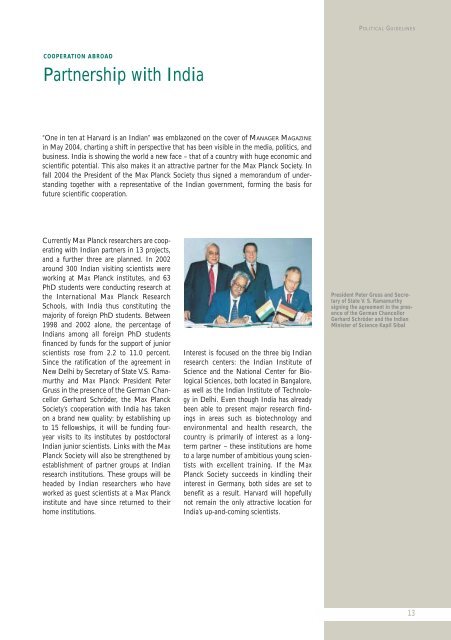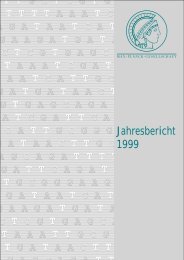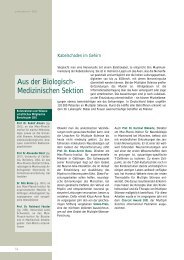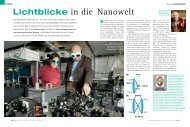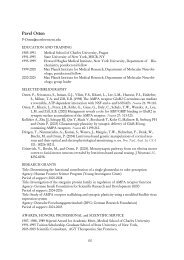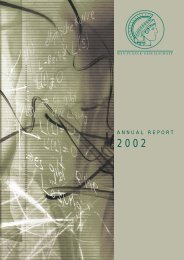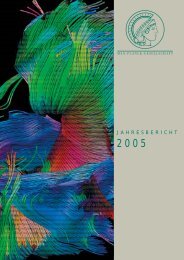Annual Report 2004 - Profil - Max-Planck-Gesellschaft
Annual Report 2004 - Profil - Max-Planck-Gesellschaft
Annual Report 2004 - Profil - Max-Planck-Gesellschaft
You also want an ePaper? Increase the reach of your titles
YUMPU automatically turns print PDFs into web optimized ePapers that Google loves.
P OLITICAL G UIDELINESCOOPERATION ABROADPartnership with India“One in ten at Harvard is an Indian” was emblazoned on the cover of MANAGER MAGAZINEin May <strong>2004</strong>, charting a shift in perspective that has been visible in the media, politics, andbusiness. India is showing the world a new face – that of a country with huge economic andscientific potential. This also makes it an attractive partner for the <strong>Max</strong> <strong>Planck</strong> Society. Infall <strong>2004</strong> the President of the <strong>Max</strong> <strong>Planck</strong> Society thus signed a memorandum of understandingtogether with a representative of the Indian government, forming the basis forfuture scientific cooperation.Currently <strong>Max</strong> <strong>Planck</strong> researchers are cooperatingwith Indian partners in 13 projects,and a further three are planned. In 2002around 300 Indian visiting scientists wereworking at <strong>Max</strong> <strong>Planck</strong> institutes, and 63PhD students were conducting research atthe International <strong>Max</strong> <strong>Planck</strong> ResearchSchools, with India thus constituting themajority of foreign PhD students. Between1998 and 2002 alone, the percentage ofIndians among all foreign PhD studentsfinanced by funds for the support of juniorscientists rose from 2.2 to 11.0 percent.Since the ratification of the agreement inNew Delhi by Secretary of State V.S. Ramamurthyand <strong>Max</strong> <strong>Planck</strong> President PeterGruss in the presence of the German ChancellorGerhard Schröder, the <strong>Max</strong> <strong>Planck</strong>Society’s cooperation with India has takenon a brand new quality: by establishing upto 15 fellowships, it will be funding fouryearvisits to its institutes by postdoctoralIndian junior scientists. Links with the <strong>Max</strong><strong>Planck</strong> Society will also be strengthened byestablishment of partner groups at Indianresearch institutions. These groups will beheaded by Indian researchers who haveworked as guest scientists at a <strong>Max</strong> <strong>Planck</strong>institute and have since returned to theirhome institutions.Interest is focused on the three big Indianresearch centers: the Indian Institute ofScience and the National Center for BiologicalSciences, both located in Bangalore,as well as the Indian Institute of Technologyin Delhi. Even though India has alreadybeen able to present major research findingsin areas such as biotechnology andenvironmental and health research, thecountry is primarily of interest as a longtermpartner – these institutions are hometo a large number of ambitious young scientistswith excellent training. If the <strong>Max</strong><strong>Planck</strong> Society succeeds in kindling theirinterest in Germany, both sides are set tobenefit as a result. Harvard will hopefullynot remain the only attractive location forIndia’s up-and-coming scientists.President Peter Gruss and Secretaryof State V. S. Ramamurthysigning the agreement in the presenceof the German ChancellorGerhard Schröder and the IndianMinister of Science Kapil Sibal13


